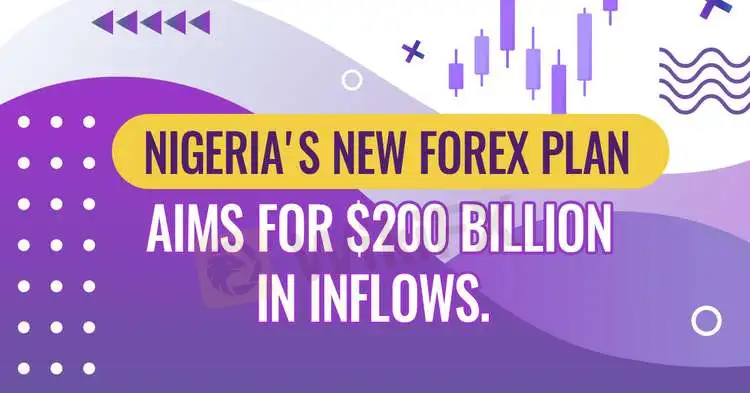简体中文
繁體中文
English
Pусский
日本語
ภาษาไทย
Tiếng Việt
Bahasa Indonesia
Español
हिन्दी
Filippiiniläinen
Français
Deutsch
Português
Türkçe
한국어
العربية
NIGERIA'S NEW FOREX PLAN AIMS FOR $200 BILLION IN INFLOWS
Abstract:Being one of the largest foreign exchange countries in Africa, Nigeria has decided to make a new plan of $200 billion in inflow for forex.

· The central bank will give higher rates to exporters, with the governor stating
· Nigerian producers will receive 10-year loans at 5% percent
Being one of the largest foreign exchange countries in Africa, Nigeria has decided to make a new plan of $200 billion in inflow for forex.
The central bank of Nigeria has devised a new strategy to entice $200 billion in inflows into Africa's largest economy: make it more appealing for producers to bring home foreign cash.
The Central Bank of Nigeria will no longer sell dollars to local banks and would instead require institutions to seek foreign currency on their own. The regulator will give long-term low-interest lending to export-oriented firms and will try to persuade exporting to return dollar revenues and deposit them in banks.
Governor Godwin Emefiele remarked that before the end of the year, “we would advise them, don't come to the central bank for international trade again.” On Thursday, he talked to the media following a meeting with the chiefs of commercial lenders.
Nigeria's central bank has struggled to increase dollar supplies and has frequently modified requirements. The current proposal is the most significant change since it ceased supplying foreign cash to money changers. The regulator, which has depreciated the currency three times since 2020 in response to a drop in crude oil prices, expects the steps to increase foreign-exchange supplies in the next three to five years.
“I'm not sure why banks will be more effective than the central bank in inducing exporters to repatriate their gains to Nigeria,” said Yvonne Mhango, Africa economist at Renaissance Capital, in an emailed answer to inquiries. “Without any indication that we would see an increase in the repatriation of revenues if the central bank” stops feeding banks, he added, the naira might drop.
According to Emefiele, the regulator established an export assistance facility that will provide manufacturers with financing for up to ten years, with a two-year moratorium and a 5% interest rate. He also stated that the central bank will prolong by a year a Covid-19 interest rate advantage that began in 2020 in order to assist producers.

DOLLAR SCARCITY
The central bank intends to make it more appealing for exporters to buy local currency and bring their offshore earnings home.
Companies have been discouraged from repatriating foreign cash to Nigeria due to a 27 percent difference in the official and parallel market exchange rates of the naira.
“We can really protect the long-term worth of our currency, as well as the stability of our exchange rate, only by increasing the productivity and earning capability of our economy,” Emefiele added.
By 4:30 p.m. in Lagos, Nigeria's commercial center, the official spot rate had fallen 0.1 percent to 416.71 nairas to the US dollar.
In July, the central bank accused money changers of exacerbating a dollar shortage and restricted deliveries to them, depriving the market of over $6 billion in supply every year. In an effort to limit dollar arbitrage, it ordered bankers to identify consumers buying foreign exchange using forged documents and make their identities public in September.

Disclaimer:
The views in this article only represent the author's personal views, and do not constitute investment advice on this platform. This platform does not guarantee the accuracy, completeness and timeliness of the information in the article, and will not be liable for any loss caused by the use of or reliance on the information in the article.
Related broker
Read more

FCA Warns Against Clone Brokers and Unauthorized Forex Firms in the UK
The FCA has flagged multiple clone and unauthorized forex firms, urging investors to stay alert. Learn which companies were named and how to avoid falling victim.

What Happens If You Trade on Illegal Forex Platforms in India?
There are many illegal platforms that offer financial services to clients. These scammers hide the risks involved because their main goal is to steal your money. That’s why it’s so important to understand the dangers of trading on illegal forex platforms

Exposing Trade Capital Limited - Siphoning Millions, Restricting Withdrawals, Charging Extra Fees
Trade Capital Limited is in the news for conducting bad practices as a forex broker. Check out the unethical practices employed by it to scam investors in this article.

5 Serious Warnings About Mirrox! You Can’t Afford to Ignore
Pay Attention! This is a serious warning you shouldn't ignore. Check out this article and know the 5 red flags about the Mirrox that every trader must be aware of.
WikiFX Broker
Latest News
MT4 vs MT5: A comprehensive comparison in terms of functionality
Top Forex Trading Strategies for the London Session
Swissquote Takes Full Control of Yuh Digital Finance App in Major Deal
Top 5 Forex Pairs Every Trader Should Have on Their Radar
What WikiFX Found When It Looked Into Decode Global
Treasury yields rise as Trump's new tariff rates in focus
Know the Major Risks of UbitMarkets, Before You Invest!
Trump's tariffs overshadow the pomp and pageantry as Macron meets King Charles
Boeing delivers most airplanes since late 2023 after ramping up 737 Max output
Inflation expectations drift back down to pre-tariff levels, New York Fed survey shows
Currency Calculator


